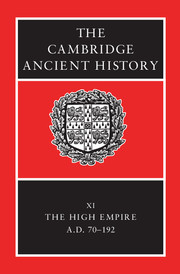Book contents
- Frontmatter
- PART I NARRATIVE
- PART II GOVERNMENT AND CIVIL ADMINISTRATION
- PART III THE EMPIRE
- PART IV ROME, ITALY AND THE PROVINCES
- PART Va ECONOMY AND SOCIETY
- PART Vb ART AND CULTURE
- 30 Literacy
- 31 Literature and sophistic
- 32 Philosophy
- 33 Medicine
- 34 Art and architecture
- 35 Religion
- Chronological Table
- BIBLIOGRAPHY
- Index
- 1 The Roman world in the time of Marcus Aurelius
- 7 The Danube provinces
- References
33 - Medicine
from PART Vb - ART AND CULTURE
Published online by Cambridge University Press: 28 March 2008
- Frontmatter
- PART I NARRATIVE
- PART II GOVERNMENT AND CIVIL ADMINISTRATION
- PART III THE EMPIRE
- PART IV ROME, ITALY AND THE PROVINCES
- PART Va ECONOMY AND SOCIETY
- PART Vb ART AND CULTURE
- 30 Literacy
- 31 Literature and sophistic
- 32 Philosophy
- 33 Medicine
- 34 Art and architecture
- 35 Religion
- Chronological Table
- BIBLIOGRAPHY
- Index
- 1 The Roman world in the time of Marcus Aurelius
- 7 The Danube provinces
- References
Summary
When the orator Lucius Apuleius of Madauros stood trial in A.D. 158 before the proconsul of Africa, he defended himself in part against accusations of sorcery by recounting the views of Plato, Aristotle and Theophrastus on the true causes of epilepsy. His intention was not only to emphasize that this disease had a natural explanation and that his own examination of a sick woman had been entirely proper, but also to suggest to the judge that, since such medical knowledge was now widespread, anyone who, like his accuser, mistook an epileptic seizure for the consequence of sorcery was an ignorant bumpkin, unworthy of all credence. At about the same time, in Athens, Aulus Gellius could consider it a great social blunder when a man of taste and learning, but ill acquainted with medical terminology, mixed up his veins and his arteries. These two incidents exemplify the high public profile of learned medicine in the Roman empire. The elder Pliny's diatribe against the evils of Greek medicine, a powerful blend of ugly truth and exaggerated insinuation, seems to have been forgotten, for healers of Greek descent, whether genuine or assumed, found favour around the empire. The elevated language of a Greek doctor at Chester is matched by the high moral sentiments of Serapion of Athens, and the citizens of Beneventum gratefully acknowledged the medical services and public charity of an immigrant family of doctors. Medicine became fashionable. No literary symposium was complete without its physician, no collection of scientific problems without its medical theme.
- Type
- Chapter
- Information
- The Cambridge Ancient History , pp. 943 - 965Publisher: Cambridge University PressPrint publication year: 2000
References
- 2
- Cited by

